Can we see the lunar landing sites with a telescope? Why is it cooler at altitude despite being closer to the Sun? Why is there no salt in sea ice? Was it windier when the Earth turned faster? What will end life on Earth sooner, the cooling core or the Sun becoming a red giant? Is modern medicine damaging the gene pool? How old is the average atom? This week David Rothery, Caroline Steel, Andrew Holding and Adam Townsend join Kat Arney to answering the science questions that you've been sending in...
In this episode
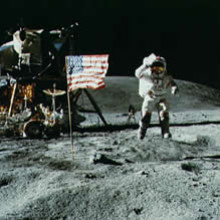
Can we see remnants of the moon landing with telescopes and prove it happened?
Kat put this question to David Rothery:
Kat - This is a big one. You know, people say, "Did it really happen? What can we see?"
David - Well of course, it happened. You can't see it from the Earth. There are some very nice pictures you can find on the internet if you go to the Lunar Reconnaissance Orbiter website. But that's NASA so they're obviously part of the conspiracy.
Kat - Clearly.
David - But seriously, from lunar orbit, you can see footprints and vehicle tracks, and the spacecraft landing sections on the surface. The Chinese claim to have seen some of the Apollo landing materials on the surface, and the Indians with their Chandrayaan 1 Orbiter saw the disturbed soil but didn't have sufficient spatial resolution to actually see the hardware. But nobody said it didn't actually happened. The Soviets at that time weren't saying the Americans are cheating. Everybody in the business agrees the lunar landings happened but you can't see it from the surface of the Earth. The moon is a quarter of a million miles away. It's too far away. You can see the space station orbiting past but that's thousands of times closer.
Kat - And is like shiny.
David - Shiny and big.
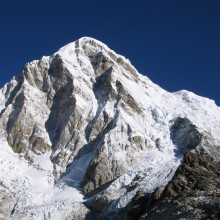
Why does it get cooler as we climb higher if we are getting closer to the sun?
We put this question to physicist Caroline Steel...
Caroline - Firstly, the sun is 150 million kilometres away. So actually, climbing up a mountain or sort of moving a little bit further away from sea level is really quite negligible in comparison - there's 150 million kilometres. So that in itself shouldn't really have an effect on temperature. But it does get colder as we increase in altitude. There's lots of ways to look at this but one way to think about it is, as air rises, it feels less pressure the higher up it rises. So it expands. And to expand, the gas must do work and to do work, it must lose energy, and therefore, the individual gas particles have slightly less energy. And the definition of temperature is sort of the average energy of these molecules. So, if the molecules have less energy at a higher altitude, there's a lower temperature.
Kat - So basically, temperature, something that's hot, it's all the molecules that are squished together and then moving a lot and that's really hot. And then if you're going up into space, the air just kind of goes wooh!
Caroline - Yeah, exactly. It spreads out and by spreading out, you have less molecules with less energy and therefore, lower temperature.
Kat - David?
David - Yeah. What Caroline is describing is for lower atmospheres. This is probably what the questioner is asking about. But you get above the troposphere into the stratosphere, it starts to get warmer again because that's where ozone molecules are absorbing solar ultraviolet energy so it does get warmer. But there's another layer beyond that called the thermosphere where the temperature is officially thousands of degrees, but you wouldn't feel hot if you were there because it's almost a vacuum. It's just the energy of the individual molecules. It's absorption of solar photons that shake at the molecules.
Kat - Ah, so they're really going as we're up there.
David - They're going for it but they are so few and far between. There's high temperature but almost no heat.
Kat - And then when you get out of the atmosphere then you're really in trouble.
Caroline - So what would you sort of feel if there's a thermometer there? Would it have a high temperature or a low one, or does it sort of depend where it is - is it near the molecules or not?
David - What a thermometer is filled with mercury or something? I don't know. It depends how you define temperature. The molecular temperature is hot, but you would feel cold. You would need to be wrapped really, really warm apart from being almost in a vacuum.
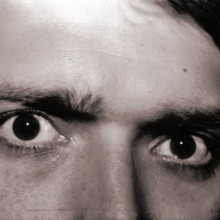
How does our vision stay steady when moving?
We eyed up Andrew Holding for an answer to this...
Andrew - I went and look this up just a bit earlier and there's kind of two ways of dealing with this problem and actually, they're both mentioned in the question. If you're a camera nerd, you may have come across two ideas - optical stabilisation and digital stabilisation. So the first one, optical stabilisation is the idea that the camera has something in it that means the lenses and the sensor all move as you move along. That kind of takes a bump out so we see them with steady cams where you have these big rigs. So when the guy walks forward, the whole camera stays still.
Kat - So this is kind of like suspension for a camera.
Andrew - Well, your whole head can do that to something. Your eyes can stay fixed on a single location and you can move your head around. So, if you take a bird of prey and you have it on your room, if you move a bird of prey on your room, its head stays absolutely still. It's quite hilarious because you can move around really quite viciously and the head will stay exactly still.
Kat - They're just like locked on.
Andrew - Yeah. Eventually, the bird of prey will get annoyed and fly off.
Kat - And peck your own eyes out or something like that.
Andrew - And then the other half is this idea of distal stabilisation. So the way a digital camera does that is it takes a bigger picture than it needs. And then as the image moves around, it centres on the same point and just throws away the external information it doesn't need. And your brain can do that slightly differently because you've got your ears turning about motion. So as the image moves around, your brain sort of says, "Well, I know it's not really moving." Of course, the problem with that is if you're in a car and you're not look at where you're going, your ears and your eyes are telling different things. Your brain goes, "There's only one thing that can be happening right now unless I've been poisoned." Because evolution hasn't yet caught up with the invention of cars and that's why we then get really sick.
Kat - Does anyone else get travel sick?
Andrew - My daughter gets very travel sick.
Kat - It's the worst. I just got worse and worse, and worse as I got older. So it's like, "Are my ears and my eyes getting worse?" And then talking to each other less.
Andrew - So, there is a thing that, as you get older, you get more dizzy. So, if you're a young kid and you're on a roundabout, you can do that and go around, around, around and walk off and it's hilarious. You do it when you're in your 30s and suddenly, you'll feel really ill. I've never heard of people doing it in their 60s. maybe there's people out there who are still able to do it and still getting strong.
Kat - If any of our listeners, please do it safely. If you would like to put your elderly relatives on a roundabout and report back and compare them with younger children that would be really great or maybe not.

If the Earth's rotation is slowing down was it windier in the distant past?
Adam Townsend put the wind up this one...
Adam - Yeah. I thought this was an absolutely terrific question. The Earth slows down because of its gravitational interactions with the moon. So, every time the moon goes around, it affects the tides, robs the Earth a little bit of some rotation. I can tell you exactly how much it's slowing down. In fact, we lose about 2 milliseconds from the day every 100 years. Kat - Yeah. I suppose over millions of years, that's going to add up.
Adam - In fact, it does. So, if you are interested when we're going to get 25-hour days? 200 million years, so not long. Anyway, to wind, wind is caused by warm. so the air on Earth gets heated up by the sun, rises and this causes a pressure difference because the hot air has gone up and so, cold air needs to be sucked and it's sucked in from the north pole or the south pole where it's colder. So, you end up with a circulation happening. But it's complicated because the Earth is spinning. So this is the famous coriolis force. If you sit on a spinning chair and you spin yourself around, and you throw like a tennis ball in front of you, the tennis ball seem to sort of veer off to the right from your perspective. And so, this confuses things because it means that the wind isn't directly going from the north pole or south pole to the equator. And, what I think is the absolute most interesting, despite the fact that we have these areas of high pressure and low pressure, and you would think therefore the wind goes from the high pressure to the low pressure, it doesn't. Actually, because of the rotation of the Earth, wind travels along lines of constant pressure. This is why we have isobars on newspaper weather reports.
Kat - The little lines when you see it, yeah.
Adam - Yeah, like from the '90s.
Kat - They are being replaced by little arrows now because we're too stupid to understand isobars.
Adam - Right. but yeah, it turns out, wind goes along these and this sort of drops out of the maths of the coriolis force. Anyway, "Was it windier in the past?" is the question. The answer is, it's complicated because lots of things affect it. So, continents slow down wind. If we're standing right here and you want to go back millions of years, well obviously, you have the buildings that are going to make some effect. How much land there is around us? Wind could go slower over land because of friction. So it slows down because.
Kat - So basically, there's lots and lots of things that could've made a difference and we don't really know. We don't know if the dinosaurs were like blown around.
Adam - So in the question they asked, if you spin a planet faster, you increase the wind speed. I'm not convinced. I think there are lots of things that affect wind speed. The effect might in fact go the opposite direction. You can get planets that go around very, very slowly like Venus. Venus has a day of 116 days. It's really slow.
Kat - I don't want to go to Venus and find out if it's windy out there.
Adam - 200 miles an hour, who knew?
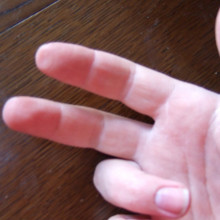
How long do nail clippings last?
Kat asked Andrew Holding for an answer to this question...
Andrew - So one, yes you're right. It's disgusting. Do not do this. Some poor person's having to clean up behind you around the world. So, it's keratin that makes up your fingernails. So, that's actually quite hard to break down. It's not something that biology really evolve for to live off fingernails which is, I'm kind of grateful for. So if you ate them, you couldn't digest them. So that's not - people aren't going to be eating them. Not many things in the world do really so they'll sit around for a while.
Kat - And there are mummies with hair and nails and stuff like that.
Andrew - So, I was at the British Museum recently and my daughter was looking at this mummified corpse. It was mummified because it's just been sat in the desert. It wasn't an Egyptian one. She just said, "Daddy! It still got hair." I had to explain to her that it was actually a person who sat there for 5,000 years.
Kat - Ewe! David.
David - Well, I'm a geologist and I know keratin is a molecule which fossilises. You can extract fossil molecules of keratin from dinosaurs. So we're talking 150-million-year-old keratin. I don't think fingernails would survive that long but the stuff of which it's composed can be found in the fossil record.
Kat - Wow! Do you know if dinosaurs ate their fingernails? Did dinosaurs have fingernails?
David - They probably ate other dinosaur's fingernails.
Andrew - They do have claws which is kind of similar.
David - And feathers.
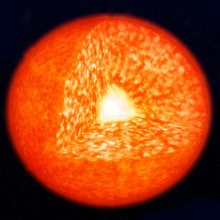
What will end life on earth first, the sun becoming a red giant or the magnetic core cooling?
Kat asked David Rothery to answer this, slightly depressing, question...
David - Paul is saying the magnetic core of the Earth is cooling down. I think what he's getting at is when the outer part of the core is fluid and electrically conducting. That's where the Earth's magnetic field is generated and if a planet no longer has a magnetic field it is not protected from the solar wind and the atmosphere can begin to be stripped away. So, if that were to happen, it would be an uncomfortable place for us to live but Mars has no magnetic field and we will still regard it as habitable for microbes. So, even if this happened to Earth, it would not end life on Earth Paul. So, if you're a microbe, you can relax. The core is cooling down, it's about 100 degrees per billion years. It's got a way to go. It's got several billion years before it would solidify. I can't tell you how long because we're not quite sure what it's made of so we don't know what temperature it will solidify at. But the sun is going to swell up into a red giant in 4, 5, 6 billion years and that's going to make the Earth intolerably hot for any kind of life. No more liquid water. So to answer the question, for any kind of life at all, the sun becoming a red giant is going to kill off life. If the question is about multicellular animal life at the Earth's surface, maybe magnetic field collapse will do that first, but we don't actually know.
Kat - Andrew.
Andrew - I've heard that the magnetic poles can reverse as well earlier.
Kat - Yeah, I was going to ask about that. It comes up in the news, like if the poles flip, our atmosphere will fly away and we'll all be stuffed?
David - No. The Earth's magnetic field is reversed many times. It gets weaker and then builds up again in the opposite direction. It happens every few hundred thousand years at irregular intervals. So it happened so many times and life is just carried on through. No signs of mass extinction events every time the poles flip.
Kat - I wonder about, what about things like our communications network and stuff like that? Is that going to cause a problem?
David - Well, they will cause a problem because yeah, satellites in space.
Kat - No Pokémon, no civilised life.
David - .won't be protected from the solar wind directly. Technological life could be very interesting in the few hundred years when the field is collapsing and rebuilding, yes.
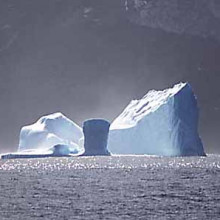
Why is there no salt in sea ice?
Caroline Steel cooled down with this one...
Kat - That is a great question.
Caroline - Yeah, so I learnt something new when I was looking into this. So, it turns out that icebergs themselves are actually just glacier fragments. They aren't ice that forms from the sea freezing. That's called sea ice. So, icebergs are freshwater because they come from glaciers and glaciers are compacted snow and so therefore, they're freshwater. But when the sea freezes and form sea ice, this ice is also fresh, because freshwater freezes at a higher temperature than saltwater. For kind of similar reason, that's why we put salt down on the roads when it's cold to stop it freezing over and our cars skidding in the morning.
Kat - So the ice forms and pushes the salt out of it.
Caroline - Yeah, the salt ions are kind of forced out of the lattice. Kat - Andrew
Andrew - So, this distillation process is actually quite interesting because if you get cider and you throw it on the backyard in Canada, the alcohol gets pushed into the core as the ice freezes around the outside. So you could distil alcohol in your backyard. It's not going to be a good product but it's the same effect.
Kat - I'm sure in Terry Pratchett books, they do that and it's called "scumble" if I recall correctly.
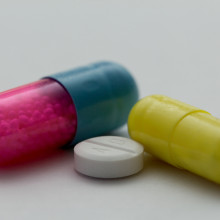
Is modern medicine damaging the gene pool?
Kat Arney gave us her expertise on this one...
Kat - That is a great question. You have to be very careful because there is a word for trying to engineer the human gene pool. It's called eugenics and it doesn't really ends terribly happily. I've been talking to some people about this and they say, well, you could argue, yes, it's bad for human evolution if you're keeping these things in. but at the same time, you're keeping a whole load of other stuff in as well that might be useful." So, as we have to adapt and change to the changing conditions and the changing world we're living in, there might also be some good stuff in there as well. So, it's very difficult to look at one gene or one disease and say that's not good for our gene pool. But what's really interesting is that it used to be, when you'd look at families with genetically caused diseases, things like - breast cancer is a good example, if people have the Angelina Jolie genes, BRCA 1 and BRCA 2. You could track families with the disease and look at people with the disease and go, "Okay, you've got that gene fault. That's what caused it." but now, we're starting to look at healthy people because genome sequencing is so cheap now and finding that they have "bad" gene variation or gene faults, but they're healthy. They're fine. People tend to call them genetic superheroes. It's absolutely fascinating trying to work out so what else is it in their genome that is causing them not to be ill? So again, it's like when we're thinking about kind of screening out or getting rid of these genetic diseases that we may be losing other things from people that actually have these variations but are healthy. Andrew.
Andrew - And also, for some diseases, it's entirely futile because they're spontaneous mutations anyway. So they may be genetic once it appears in the population but things like Huntington's will appear even if you haven't got a parent with it sometimes. So, you can't entirely remove them anyway.
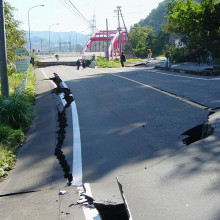
Can humans cause earthquakes?
We put Moosa's question to planetary expert David Rothery...
David - Yes, with qualifications. It depends what Moosa has in mind when he says an earthquake. I mean, the vibrations within the Earth have different degrees of intensity and people will have heard of the Richter scale. There are 100 or so earthquakes of magnitude 6 or above somewhere in the world every year like the one in Italy a couple of weeks ago. There are millions of magnitude 2 earthquakes. How small can you go and still call it an earthquake? Coal mines collapsing cause vibrations which can be detected, sometimes felt by people really close by. Is that an earthquake?
Kat - I mean presumably, something like a massive bomb going off as well would cause the Earth to shake.
David - That cause vibrations through the Earth which you can measure at a certain distance and workout the energy at the source. Fracking is supposed to cause earthquakes but there's a debate about whether it's causing an earthquake that wouldn't have happened anyway. If you frack close to a fault, you may give the impetus to let that fault move and the earthquake will happen now rather in a hundred years' time. Is that caused by humans or just triggered by humans and is there a difference there? It depends on what size of earthquake Moosa has in mind and whether he means cause something which would never have happened or just trigger a natural event which was going to happen anyway if you'd waited long enough. Like many questions in science, a great question but very complicated to answer.
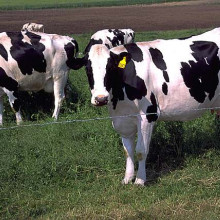
Why isn't cow's milk contaminated by what's in the animal's intestines?
We put this question to biologist Andrew...
Andrew - Well, if we just move back from the question and think about what the intestines have to do. So intestines have to get all the stuff out that grass partially digested into the body but only the bits we want. So they mustn't get out all the bacteria which could be toxic. You don't want to get it into your bloodstream and get septicaemia. You don't want to get any toxins that are on the food. So, your gut really is a very, very clever system that only transport and get what it wants. So, some of that is done by osmosis. So the concentration of different molecules draws the water out and some of it is done actively. So energy tends to pour food out. Of course, you then have the blood system actually, not a tiny gap before you ended up with the other while you make the milk. Of course, the cells there are very carefully putting the right things in that milk, not just anything they come across. So, if you didn't have a good barrier with your intestines, you would be getting really sick over time. So it wouldn't just be going in milk. It would be going everywhere. Actually, if we think about the milk, for the one thing you probably don't think about is you do get infections in others or in people in breasts and you get mastitis. This is a real problem for people with breastfeeding because you got this milk which is very good for growing bacteria. You get this really sore infections and it's really unpleasant for the mother. Of course, the solution today is just antibiotics but you do have to make sure you don't get bacteria in there because they have these horrible side effects.
Kat - And also, there are some bacteria in milk and that's presumably why we pasteurise it so that we don't get sick from drinking it.
Andrew - Yeah. But they can come in different stage. They can come in through the pumps and stuff like that. What you give to a baby also come from many of the immunities from the mother as well. So, it's a complicated product, milk.
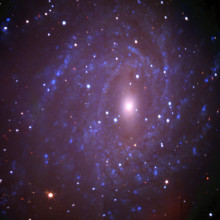
How do we use light to work out that the universe is expanding?
We put this question to PhD student Adam Townsend...
Adam - So, most of us know what's called the Doppler Effect. So this is when a fire engine or a police car or an ambulance, and I'm familiar with all of these because I live in London. It comes straight past your window and I and you hear it go. And like, "Neno, neno, nenooooo, .." As it comes pass you, that's a great sound effect though - as it comes past you, the pitch drops, the frequency drops. The same thing happens with light. Therefore, as the stars move away from us - I think Hubble actually spotted this. Hubble was looking at sort of nearby stars and spotting what they were made of by looking at their colours. And then he looked at stars that were slightly further away and found that they were sort of similar but everything was just a little bit more red. And then he looked at ones that were really, really far away. And saw that they were even more red. Therefore, he was able to sort of see that okay, everything is being shifted towards the red spectrum. This is called red shift.
Kat - Red light has longer wavelength than blue light.
Adam - Right. So then basically, by looking at the change in the colour of light where it's like the galaxies are going past us going..
Adam - Yeah and in the same way that say, as the fire engine, goes past the frequency has decreased, they found that it went more red so the frequency has decreased.
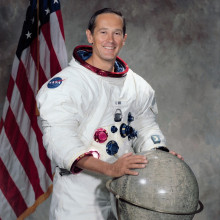
If you were in space without any protection what would kill you first?
We put this question to the team...
Andrew - So this is absolutely brilliant. You've got to first start how do you get in space. With a lack of a transporter there, I'm going for someone who opens the airlock whilst you're taking a nap and it's on the ISS and suddenly the pressure drops. The first thing that's going to happen, it's a bit cold because we've got the gas expanding again - we discussed earlier. You're going to also notice that the air is going which you need to breathe. So the crucial thing to do at this point is you got to remember not to hold your breath.
Kat - That's really hard.
Andrew - I don't think so because if you just think you need to scream, that might be quite natural.
Kat - Okay.
Andrew - Because otherwise, all the air in your chest is going to want to expand through your chest and that's not going to be good for you.
Kat - Okay, so you would explode from your lungs. Caroline.
Caroline - You'd also have to be careful to not cry. Because of the lack of gravity, your tears don't fall. They just kind of accumulate on your face and can block your mouth and nose, and you could drown in your own tears.
Kat - Will they be frozen though?
Caroline - I suppose. Would they freeze?
Kat - You drown in your own frozen tears.
Andrew - Oddly, they boil and freeze. So the low pressure means they boil, but the low temperatures mean they freeze. So you get this kind of micro crystals forming.
Kat - Abrasive or sort of maybe exfoliating.
Andrew - Well, they're probably going away from you.
Kat - Adam, what do you reckon?
Adam - Well, I was going to ask, how much time are we giving ourselves here?
Andrew - Well, not very long which is very - the door has opened, the air is rushing out. It's like a balloon.
Adam - Are we talking we have maybe a minute to live or.?
Andrew - So on the air front in 15 seconds, your brain will basically decide to protect itself and you'll be unconscious. In about 2 minutes, you'll be asphyxiated.
Adam - So, we're not worrying about the abrasive effects on our skin of our frozen tears then because we're going to die because it's hard to breath.
Andrew - If someone gets to you in 2 minutes and if you're outside the ship by this point, you're going to start to get sunburn quite badly. As you got high factor sun scream you';ve avoided this.
Kat - Why would you get sunburn in space? You always think of it as being like dark and cold. Why would you get sunburn?
Andrew - So on the Earth, we have the ozone layer protecting us from all the UV but you take the ozone layer when all these things protect us on the planet, and suddenly, you've got raw sunlight on top of you. So, you're suddenly going to get a huge amount of radiation on your skin. Kat - This always reminds me of the joke about the astronauts who wanted to go to the sun and then thought, "Well, it's going to be really hot during the day so let's make sure we go at night."

How old is an Atom (say hydrogen)?
We asked Caroline to give us an atom's age...
Caroline - So, that is a very, very tricky question. So, as kind of said in the question, it depends on what kind of atom we're talking about. It depends on which atom we're talking about. So, most hydrogen atoms are 13.7 billion years old as they were formed in the Big Bang. If you have a large atom, it's formed from the fusion of small atoms so it's likely to be younger. But any sort of random atom you pick could be anything from 13.7 billion years old to made the other day in a fusion reaction. Kat - So things like iron and stuff like that and the heavier elements, they are made in stars, supernovas?
Caroline - I think they can be made in supernovas, it requires dense, really packed material and a lot of heat to make these sort of bigger elements.
Adam - All we had after Big Bang was hydrogen and helium. Heavier elements are formed in stars and then distributed through the cosmos when the stars throw off material, most famously in supernova explosions.
Kat - Isn't it that Carl Sagan phrase that, "We are all made of stars."
Adam - We're star dusts.
Caroline - Which is completely true.
Kat - First time I heard that, I was like, "Wooh!"
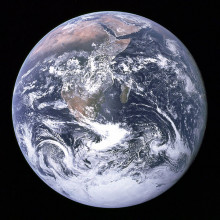
Does the earth have an excess or deficit of electrons?
We put this question to planetary scientist David Rothery...
David - Well, I admit to having had to look this one up. It depends whether Donald is talking about the solid Earth or the planet Earth including its atmosphere.
Kat - What are the differences then?
David - The ground beneath your feet does carry a negative charge. The atmosphere carries a positive charge.
Kat - So does that help to keep the atmosphere on?
David - No, that's gravity.
Kat - Right, it's gravity so it's not related.
David - It does explain why there are lightning discharges sometimes between the atmosphere and the ground. That's just a current pathway forming that lets the charge neutralise locally. Now, why do we have this charge imbalance? It's very hard to understand and it's defeating me but the positive charge on the atmosphere would be because the Earth is receiving charged particles from the sun all the time. Protons newly formed hydrogen nuclei, to go back to the previous question if you like, streaming along magnetic field lines towards the Earth. Some negative particles mostly electrons steaming along as well. So the charged particles going past the Earth are deflected by a magnetic field. But some particles, some electrons and our atmospheric atoms especially our outer atmosphere are stripped away in this solar wind. I think that's why we get a positive charge in the atmosphere because we've lost a few electrons. I guess lightning discharges between the atmosphere and the ground locally redress that balance every so often. But it's very, very complicated. Because we regard the Earth as electrically neutral, that's why you put an Earth wire to stop you getting electrical shocks. But it depends what your net positive or net negative charge is measured to the relative to. So, if you want a safe electrical conduct current going from your socket to your toaster, you want it to be neutral relative to the environment around you which is the ground. So although that is technically a negative charge relative to cosmos, it's all the same charge level as your toaster. So you can touch and get your toast without getting a shock.
Kat - That is a very good idea. So basically, we can't Earth the Earth though, can we, the planet Earth?
David - You could get a big wire and attach it to the sun I suppose but I wouldn't recommend it.

Is there a food I could eat exclusively?
Kat Arney put this to our panel...
David - Pizza stagioni or something?
Kat - Quattro stagioni - all the four seasons that's got everything. A naturally occurring food -can anyone think of anything?
Andrew - While not completely naturally occurring, a lot of people claim Guinness and bananas.
Kat - Guinness and bananas, possibly. I'd be concerned about the protein.
Andrew - And the alcohol level, you probably have to take in everyday will probably have side effects.
Kat - Anyone else got a food that they could live on?
Adam - I mean obviously, these processed ones exist, working in a math office, there are at least two people in my office who are trying to survive on just these smoothies of powder and water. And sometimes they tasted strawberry and sometimes they tasted chocolate and most of the time, they tasted neither and just disgusting.
Kat - We've done a bit of thinking here and apparently, you could probably live for a little while on just raw meat, on uncooked raw meat.
Adam - Why uncooked?
Andrew - Vitamin C is one of the things people often talk scurvy if you don't get enough vitamin C. It's broken down by cooking and ageing. So fresh food is really, really good to get vitamin C and the reason sailors used to get sick is they didn't do fresh food. It's quite hard to get fresh food in the middle of the ocean unless you're fishing, which they didn't do so much.
Kat - Presumably because you can nourish a person with it, human milk should be a goer? It's kind of gross.
Andrew - It's probably misbalanced. It's not the worst choice but it's fatty. It's got all sorts of things there for growing baby.
Kat - And not an adult. We've got a little bit of research from the livescience website, it's a wonderful piece actually. It's worth looking up because it tells you all the ways you would die if you didn't eat enough things. So without all the right amino acids, they're the building blocks of protein, your hair would start to lighten in colour, your fingernails would get soft, your lean body mass would start to suffer. Not just your muscles but also your heart and organs. Eventually, your heart shrinks so much that you die. So yeah, don't do that people.
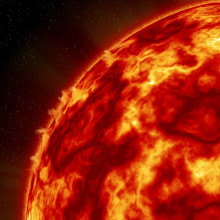
How does heat travel through space?
Kat Arney put this to Caroline Steel...
Caroline - So we kind of mentioned this earlier when we were talking about ways to die in space. So, heat does travel through a vacuum. It just doesn't travel in a normal kind of conduction way that we quite often automatically think of. So for something to conduct like when you put a metal spoon in a saucepan and it gets really hot, you acquire particles as the heat energy is transferred through the particles. But heat can also travel through radiation which is part of the electromagnetic spectrum so waves travel from the Sun to the Earth and heat up the atmosphere. So yeah, heat does travel through space and it probably would give you really bad sunburn if you were stuck out there with no suit or anything.
Kat - Is this why things like you get infrared heating lamps and stuff like that?
Caroline - That's also radiation, yeah. So it's a different way of transferring heat. It's using heat waves rather than sort of transferring heat through collisions of particles.
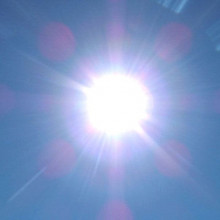
How does sun on your skin make vitamin D?
Kat Arney put this to Andrew Holding...
Andrew - So that's a great question. So yes, we need UV to make vitamin D and unlike a lot of biological processes, it's actually done spontaneously. There's not an enzyme that does it.
Kat - So, it's like a chemical reaction that's just happening?
Andrew - Yeah, so it's a specific type of chemical reaction called a pericyclic chemical reaction and that's where the bonds rearrange spontaneously when the energy comes in the right source. Depending whether it's heat or UV will depend to how the shape of the molecule is after that reaction.
Kat - So, there's these precursors that we're making and the UV light comes in, hits our skin, and does the chemistry.
Andrew - Yes. So we make a precursor up to a certain point. It's cholesterol and then it does the conversion and then it gets taken a little bit more to make into vitamin D.
Kat - But that does depend on light actually hitting our skin. So what happens if you don't get enough UV hitting your skin?
Andrew - If you're an animal with fur, in fact, it's really interesting. They obviously can't get light to their skin especially if it's a dark coat. So, they actually put in oil to put on their coat and that's where it gets UV and then they lick it back off.
Kat - So they're making the precursors, they're secreting them out themselves, the chemistry happens, and they eat it.
Andrew - Yeah.
Kat - That's kind of disgusting.
Andrew - Well, cats do lick themselves.
Kat - I mean, we don't do that presumably.
Andrew - Do you lick cats?
Kat - I don't lick cats. I don't even like cats very much at all. But what happens? Is there actually enough sunlight to make enough vitamin D?
Andrew - This is a big challenge actually today when we're worried about getting too much sunlight. So, if you're inside your house and you decided to sunbathe behind your window, you're not getting enough UVB. So, UVB is the more burny one because the glass blocks it. So you have to go outside which isn't terrible but in the UK of course, we don't have much sun in winter. So then a whole load of other things come into play depending on your skin coloration. So if you're very pale and you get a lot more UV getting to the parts for what it needs to get to then you do produce still not great amount but probably enough. If you had a skin that absorbs lots of UV, you'll go and have to probably take supplements.
Kat - And you can get vitamin D from food as well. You're going to need a balance of sunlight and the right food, and then maybe supplements in the winter as well.
Andrew - So, I think the current advice now is we actually should all be just taking supplements because we cover up with stuff to stop skin cancer so sun cream that blocks most of it. So actually, we're not doing ourselves a great favour on vitamin D front but we are doing ourselves a great favour on having great skin.
Kat - Well there you go, avoid the skin like a handbag by keeping nice and young, and staying out with the UV as much as you can I reckon.
Andrew - Yeah, but do get outside that's great.
Kat - I work too hard.
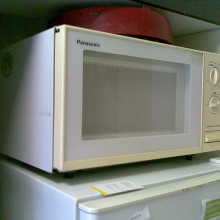
How does a microwave burn food?
Kat Arney put this to Adam Townsend...
Adam - I was unconvinced so this morning, I did a little experiment so I brought a little present into the studio. Andrew is going to take this one and describe this present to the audience.
Andrew - I've got a secure Tupperware tub and inside it is a small piece of whole grain bread. On it, it has a very definite charred mark in the middle like you've held it against a cigarette lighter.
Adam - Can you smell that here?
Kat - I just got a whiff. That's definitely.
Andrew - It's also very solid and hard.
Adam - It is incredibly solid, incredibly hard. That smell though is the same smell that my flat now completely smells of. So don't try this at home. So I put a piece of bread in the microwave for just 2 minutes and after 2 minutes, the middle just started smoking. And so, you get this nice black burn mark.
Kat - What has happened? A microwave does work by making the water in the food vibrate. So how can it do something that seems like a dry fire?
Adam - The first thing that happens here is that all the water gets evaporated off so you get loads of steam. Microwaves are set the frequency that water is very receptive to which means that water heat up. But all of the stuff, in bread in this case, is still getting slightly excited by the microwave energy. So it's just that water is normally more receptive. So you take away the water. What's left while it still tries to absorb some stuff, some of the starch in the bread for example, and so, it also heats up, and ends up stinking up your kitchen.
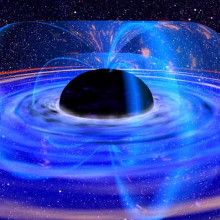
Why do black holes have more gravity than anything else?
Kat Arney put this to David Rothery...
David - Well, the answer is yes to both those bits at the end. I think the misconception that Byron has is that black holes have more gravity than other objects. It's the strength of the gravity close to the event horizon which is sort of the boundary of the black hole. If you were to take the sun and magically compress it to the density that it would require to become a black hole, the gravity at the event horizon, new surface around that would be extremely strong. But out here at the Earth, we'd notice no difference. So the total gravity around a black hole doesn't depend on whether it's a black hole or not. It just depends on the mass inside it. The sun can't become a black hole naturally. You have to have a mass of - it's the Chandrasekhar limit which I think is 1.4 solar masses or something - before a star has enough strength or gravity to force its matter into the density required to become a black hole. There are some super massive black holes, which are billions of solar masses base of the things, colliding black holes that were detected by the gravity waves detections. Those were really enormous objects and of course, have lots of gravity because they've got enormous amount of mass in. But the short answer is the strength of gravity at a distance of a black hole is independent of whether or not it's a black hole. It just depends on how much mass has gone into it.
Kat - Because it's all crushed into tiny, tiny space.
David - It's all crushed into such a small space that the gravity really close to it is so strongly that light can't get out and you couldn't get that close without being ripped apart by the tides.
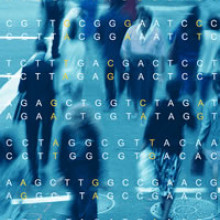
Can you genetically sequence sour dough?
Kat Arney put this to Andrew Holding...
Andrew - So I think it's a natural fermenting so you don't need to add yeast like you do with normal bread but that's about as far as I know.
Kat - But presuming it's working on microorganisms from the environment.
Andrew - So, a lots of the alcohol you can make without adding yeast is done by the fact there's yeast on the outside of apples. So, I guess there must be yeast somewhere around the place.
Kat - Exactly. So I mean there's yeasts. Did I say there's a beer that someone's making from Roald Dahl's chair or something weird like that? There are yeasts everywhere so presumably, you could sample them and sequence them.
Andrew - You could sequence for yeast. So I mean, maybe I just know too much about alcohol but the yeasts used in different beers, they're very tightly guarded secrets because if you like took a bread yeast into a random beer, it could taste absolutely awful because they make other things at the same time. That's why marmite could be made with different brewer's yeasts. I'm not sure if it tastes any different.
Kat - Tastes disgusting. But I did go and interview someone. They're making little portable labs called the Bento Lab. I think that one of the people using it is just sampling loads of beers to look at the DNA in the yeast and doing a project on that. So I work out if any beers are related to each other and to trace the yeast's facts so that would be a cool project I reckon.
Andrew - The trouble with small organisms is they do of course evolve. They change their genome a lot quicker. So, if you tried this on bacteria, you probably would have trouble trying to pick a pattern because you find these swapping changes all over the place. They do what's called horizontal gene transfer where they don't just evolve in a linear progression. It hands a gene to its neighbour because they can.
Kat - They swap little bits of DNA, don't they? Because I did have this idea of going around all the recording studios and gig venues in London and taking samples from the microphones and to see what germs are going around.
Andrew - Don't do it.

How do objects orbit in space?
We asked Caroline how the Earth stays in orbit...
Caroline - I like to think of this sort of like a ball on a string. So, the ball is say, a planet, the string is the force of gravity and your hand that's swinging the ball around is the Sun or whatever the orbiting object is orbiting. So say, we're talking about a planet orbiting our Sun. So the gravity attracts the planet at a perpendicular direction to its motion. So it keeps traveling forwards but getting pulled into the sun, but not quite fast enough to spiral in and crash into the sun. But it's also not traveling fast enough to get hurtled into space. If it were to slow down, it would crash into the sun but because there's no particles, there's no air resistance so the planet keeps going and doesn't crash into the sun, doesn't fling off into space. It's kind of in a perfect happy medium.
Kat - Is it Newton's - I can't remember whose example originally of like firing a cannonball to explain that and if you had fired a cannonball fast enough, you could get it into orbit and that's the principle of space flight. Basically, you have to fire something up fast enough and the Earth falls away faster than the thing falls back into Earth.
Caroline - Yeah, exactly so the cannonball is falling towards the Earth, but the curvature of the Earth is such that it can never actually land. It just sort of keeps going and that's exactly the same principle as with planets orbiting the sun and moons orbiting planet.
Andrew - So I was wondering, with these orbits, how do we get so many planets having exactly the right speed to orbit? Because I would've thought loads of them will just fall in the sun and loads of them would shoot off.
David - If you fall sunwards, you start traveling faster and therefore, you can find yourself traveling fast enough to stay in orbit.
Andrew - So it self-corrects it?
David - I think so, yes.
Kat - When was the Solar System formed?
David - When was it formed? 4.6 billion years ago. There were lots of planet size bodies originally. We call them planetary embryos and they would crash into each other. So it's very difficult to define the age of the Earth because which of these parent bodies do we regard as a proto Earth(?) Until you've got a body that's almost an Earth mass, you haven't got the Earth. But it all happened within 10 or no more than a hundred million years at 4.6 billion years ago.
Kat - And that's everything just accreting together tumbled up.
David - It's starting off as gas and dust. The particles bump into each other. They're fluffy if they stick together. They get bigger and bigger then they get enough gravity to start attracting each other and then you've got runaway growth and it all kind of speeds up.

Do we have areas of our bodies with different genes owing to mutation?
Kat fills us in on this question about genetic mutations...
Kat - This is a fantastic question because the answer is kind of yes. We will pick up mistakes, changes, mutations whether that's from the processes of life like copying DNA or from the oxygen that we're using to make energy that damages DNA loads and loads, and loads. Also, there are chemicals in the environment and things like ultraviolet light, chemicals in tobacco smoke that can damage the DNA in different cells and that can be propagated if those cells divide. So yeah, we are made up of probably a little bigger or smaller clumps of cells that are all very, very slightly different. Obviously, a good example of where this really goes wrong is cancer because that's when cells have picked up a number of mistakes that have made them start growing out of control.

What's the difference between earwax and bee's wax?
Andrew buzzed in with an answer to this waxy question...
Kat:: I love this.Andrew:: So, the main difference is, don't eat earwax. Wax is generally made of long hydrocarbon molecules, oils and fats. The main one in beeswax is a combination of the product of a fatty acid and an alcohol so that's what gives most of its waxiness. Actually, it's not too dissimilar with what's in the ear. I was trying to work out what the best defining feature is why you wouldn't want to eat one and eat the other because the smells are really just due to what impurities make it up. The main difference I could come down to was that beeswax, what makes these lovely honeycomb structures and they then put honey in them, the bees secrete to make it. Your ears make earwax to pick up dead cells, bacteria and hair. That really is the difference. So, you get quite disgusting thing out your ear where you get honey from the beehive.Kat:: Lovely!Andrew:: But the wax is fairly similar.Kat:: But then the wax, there's two types of earwax as well, isn't it? There's like wet wax and dry earwax. So you couldn't make a candle out of either of them.Andrew:: I think you can. I'm sure you can. It - just don't.Kat:: Christmas present ideas!Andrew:: That difference in melting temperatures, depending what ratio of a different wax chemicals used to make it but effectively, a wax is just an oil that has a melting point above room temperature so it solidifies.

If my car gives me static shocks whyis it a good place to be during a lightning storm?
Caroline clears up confusion about cars in thunder storms...
Caroline - It is a good idea to be in your car in a lightning storm. So, static shocks happen when two materials rub against each other and charge transfers from one to the other. So this could be when you sat in your car wearing some synthetic material and it rubs against a car seat and you build up a negative charge and then you innocently reach out to grab your car door handle and the negative charge from you discharges through the car and makes a sort of nasty shock. But lightning, it's a good idea to be in your car if there's a lightning storm because if lightning were to strike the outside of your car, the lightning would travel through your car body and not actually harm you. That's because the car - well provided your car is made of metal - the current will want to travel through that because current likes to go through the path of least resistance so it will travel through the car, to the ground, shielding you. This is often referred to as a faraday cage.
Kat - You've got rubber tires as well. Is it something like you're meant to wear wellies as well in an electrical storm?
Caroline - So, the rubber tires thing is quite often - it's been a myth. It's an easy answer to why you should get in your car but that's not really why because the current does still flow through the tires to the ground. It does discharge. But yes, if you're wearing rubbing shoes, rubber is an insulator so you're slightly more protected from an electric shock. Because it just makes a bit more of a resistive path for the current to travel and it's less likely to travel through you.
Kat - Adam.
Adam - How do I stop getting shocked by my car?
Caroline - So, you could buy a non-metal car which is an option.
Caroline - Or you could wear clothes that sort of build-up static charge less. The cheaper more plastic clothes build up stuff that charge more.
Kat - You're wearing like nylon. Stop wearing the nylon '90s.
Caroline - Yeah, nylon is bad plan. I remember I used to have a dressing gown that I could build up such a static charge on by rubbing it against the carpet that if you turned off the lights, you could actually see the little electric discharge if you touched it, so don't wear that dressing gown.
Adam - No driving with dressing gown.
Caroline - No driving in dressing gowns. Go for sort of - I'm not sure what materials are not good at building up charge.
Kat - Linens, cottons.
Caroline - Imagine stuff like silk and things like that would be fine. You can get silk suit.
Adam - Silk trousers.
Caroline - Silk suit and a wooden car, and you're absolutely fine.
Kat - No chances of electric shocks.
Adam - Thanks very much.
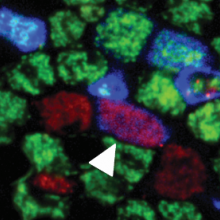
How many new somatic cells does a person produce every second?
The panel give us their guesses on this tricky question. Fortunately, Kat Arney is armed with the facts...
(David) - You're looking at me. You want me to guess.
Kat - Yeah, I want everyone to have a guess.
(David) - There's billions of cells in our body so we're probably making hundreds of thousands every second, 10 to the 5.
Kat - Adam?
Adam - But now we've got one guess. All of our guesses are going to be basically the same because you know, we've anchored the guessing. I'm going higher.
Kat - Andrew?
Andrew - I feel under a little pressure right now.
Kat - You are a biologist.
Andrew - This is not my field of biology. I'm going for a million.
Kat - You're going for a million? A million cells per second.
Caroline - I'm going to go for lower. I remember reading somewhere that you do retain some cells for quite a long time so I'm going to go for tens of thousands rather than hundreds of thousands.
Kat - I've been doing a little bit of maths. Math is not my strong suit but I have been having a little go at this. Your whole body is made up of probably now the best estimates are around this 37 trillion cells in your body. Caroline is right. Some of your cells don't multiply very often, things like your heart muscle doesn't really multiply but then cells like your skin cells, your immune cells your red blood cells, your gut cells, the sort of the epithelia, they really, really, really multiply. It turns out, every single day, roughly, 50 billion cells in an adult will die. Okay, 50 billion of your cells die because there's this turnover, you got to make new cells, got to keep repairing, got to keep renewing. And so, I think every second, there's about 2 million red blood cells made. You'll also have cells being made in your gut, in your skin, so it works out probably if you do the sums, if about 5 million cells are dying every second, it's probably about that many being made every second as well. There's something like 40,000 skin cells in a minute which always makes my flesh crawl.
Caroline - Gosh! I lost that one.
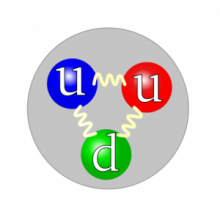
Does a proton always have the same electron?
We asked David and Caroline for their thoughts on this slightly philosophical question!
David - No, it doesn't. The nucleus will be that old but it can gain its electrons and lose it and yeah.
Kat - We're getting sort of philosophical like what is an atom? Is it like always, do you step into the same atom twice?
Caroline - I imagine there's not many hydrogen atoms that have kept their same electron for 13.7 billion years. Also, I'm not really sure how you test that. I don't think you can. I think it must be speculative really.
Kat - Yeah, that you can identify an individual electron.
David - You can't fingerprint an electron. But the state of the universe in the early days, the nuclei and electrons would've been separate.
Kat - Wildly promiscuous swapping of electrons.
- Previous Dawn of the Anthropocene
- Next Gold from garbage









Comments
Add a comment